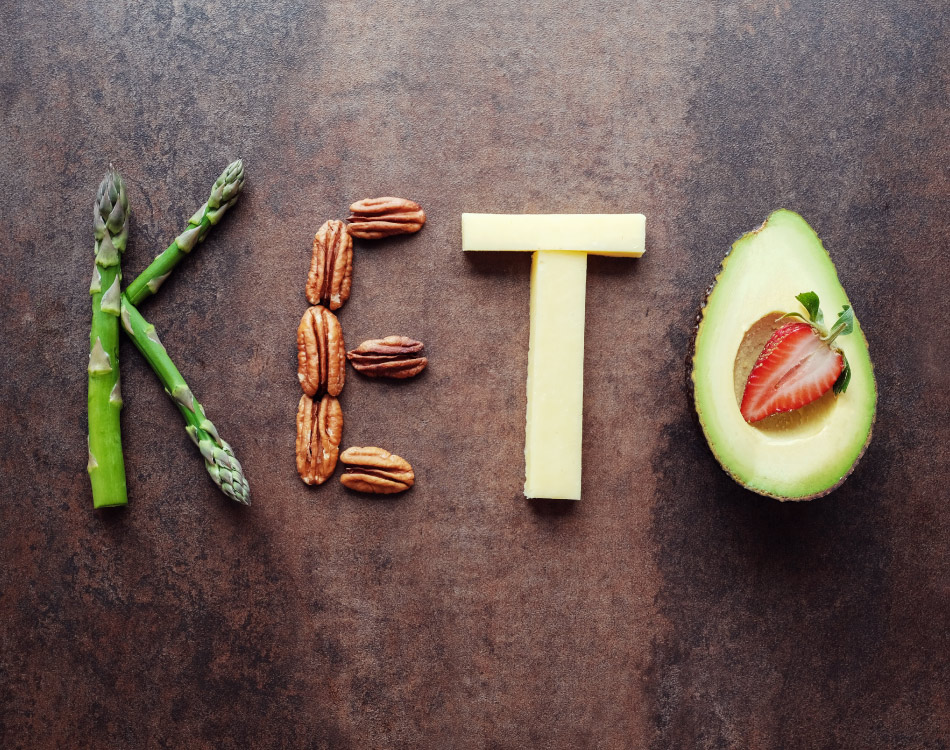More endurance athletes looking for sustained energy have turned to ketogenic diets to achieve ketosis to fuel their performances on fat during training and racing.
Fat offers an ideal fuel source because it is energy dense, providing nine calories per gram, versus just four calories from an equivalent dose of carbs.
Perhaps more importantly, fuelling more of your efforts with fat preserves glycogen for those intense efforts or that surge for the finish line.
READ MORE | Unlock Fat-Fuelled Energy With Ketones
Going low-carb
Athletes who want to benefit from fat-fuelled efficiency should ideally follow a strict very low-carb diet (VLCD) diet known as a ketogenic diet.
This eating plan consists of a very high fat intake, coupled with a moderate protein and low carbohydrate intake.
The basic guidelines require restricting carbohydrates to just 50g/day or less, which is quite extreme – it’s the equivalent of a cup of brown rice, for example.
The low carb intake effectively shifts the body’s primary energy metabolism pathway away from glucose to lipolysis – the processes where the body breaks down fats into free fatty acids. The liver then converts these free fatty acids into ketones in a process known as ketogenesis.
READ MORE | Support Your Keto Lifestyle With Supplements
The keto kick
The ketone bodies your body produces then circulate and replace glucose as the body’s primary energy source, fulfilling the various vital functions that glucose had in the body.
As ketone bodies in the blood increase over time, they will eventually reach a threshold level, which is when the body technically enters a state of ketosis.
Apply these tips to help you achieve ketosis:
- Eat sufficient fat, particularly foods high in medium-chain triglycerides and monounsaturated and polyunsaturated fats, including coconuts, avocados, natural oils, tree nuts and certain seeds, as well as unprocessed meats and leafy green vegetables.
- Drink sufficient water and replace electrolytes.
- Get sufficient sleep.
- Monitor your calorie intake to avoid overeating.
- Constantly monitor your blood lipid profile to manage any adverse conditions that may arise from an increase in cholesterol.
- Progressively reduce the amount of carbohydrates consumed over time to no more than 50g/day.
- Supplement with a multivitamin and mineral complex to compensate from a lack of micronutrients usually derived from the carbs, fruit and vegetables excluded from a ketogenic diet.
- Include a fibre supplement to maintain healthy digestion.
- Test your urine using keto strips or sticks to determine when you reach a state of ketosis and maintain this state as required.
- Train using a high-volume, low-intensity approach until you adapt.
READ MORE | Curious About Keto? Let Us Explain
Beware the keto flu
Severely restricting an entire food group (in this case carbs) has its challenges, both physiologically and psychologically. A common physiological issue is known as keto flu.
Athletes can experience this phenomenon when entering the initial induction phase of a ketogenic diet as a consequence of their radically reduced carbohydrate intake.
READ MORE | Forget Your Fat Phobia: Not All Fats Are Bad For You
Countering the keto flu
You can alleviate keto flu symptoms by replenishing electrolytes and minerals in the body in the form of potassium, magnesium and sodium.
You may experience a drop in mental and physical performance for a few weeks as your body tries to tap its missing fuel source.
Abandon your ketogenic diet if after three weeks your body hasn’t adapted.
What to avoid when making the shift to ketosis:
- Don’t significantly reduce your carb intake without going through a “metabolic shift” – the process whereby the body is weaned off its reliance on glucose and learns to function properly using ketones as an energy source.
- Don’t eat processed meats, root vegetables, legumes (including peanuts), sweet fruits, grains, fast and convenience foods, low-fat variants, sweets, chocolates, processed carbs, sugar, artificial sweeteners, starchy carbs, baked goods, and margarine.
- Don’t drink sugary drinks, sweetened beverages, excessive dairy milk or alcohol.
- Don’t include too much protein in your diet. The body can convert amino acids into glucose, which can shift you out of your ketogenic state.
- Don’t give up if you experience brain fog or a dip in cognitive function initially. The brain relies primarily on glucose and adaptation to ketones can take up to three weeks.

















Leave A Comment